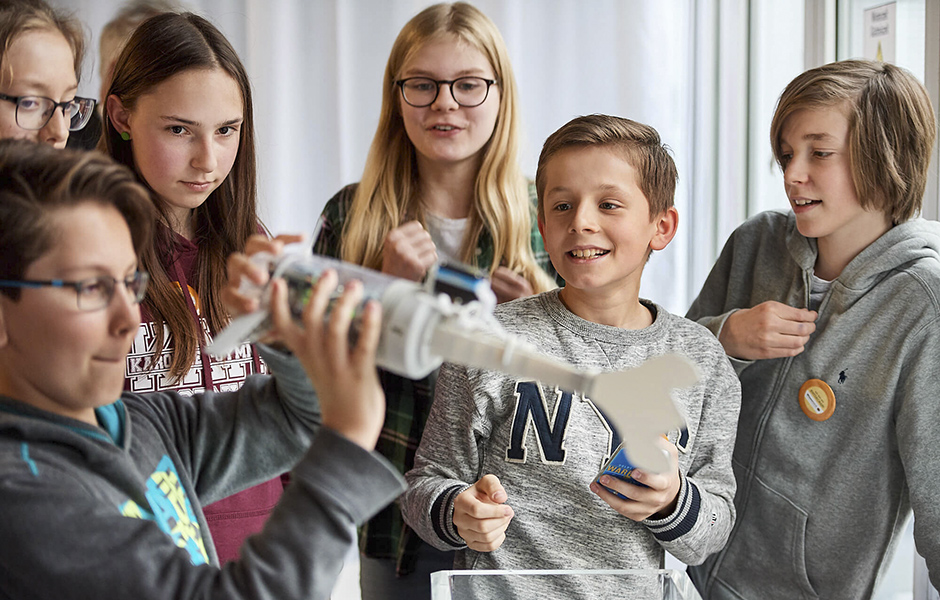Together we’re better
Companies cooperate with universities, colleges and research institutes to drive innovation. Intensive collaboration can yield benefits for both sides. KSB has thus developed a global network to strengthen its capacity to innovate.
Many companies place innovations at the centre of their strategic vision. KSB defines them as solutions that
create added value for customers and have been successfully implemented in the market – in the form of new
products, services or business models. The pump and valve manufacturer is currently working intensively on
determining what the future holds for fluid handling, i.e. the entire process of fluid transport. The basic
operating principles of the products involved will remain unchanged. But in the future, the classic disciplines
of mechanics, hydraulics and drive technology will increasingly merge and be supplemented by communication
between the components and artificial intelligence. By focusing its research and development activities on these
trends, KSB can improve the energy efficiency and sustainability of its products. Other central research topics
include materials engineering and additive manufacturing processes such as 3D printing. These offer unprecedented
opportunities
for KSB.
Close cooperation between companies, scientific institutes and development partners enables research and development work to be conducted at a technologically advanced level. The aim here: Laying the foundations for innovative, sustainable solutions for the world of tomorrow.
Close cooperation between companies, scientific institutes and development partners enables research and development work to be conducted at a technologically advanced level. The aim here: Laying the foundations for innovative, sustainable solutions for the world of tomorrow.
Global research and development networks
“Particularly in our early-stage development and basic research work, we rely not only on internal expertise, but also on cooperations with universities,” says Dr Stephan Bross, member of KSB Management responsible for Technology and Digital Transformation. “Universities have a greater degree of creative freedom and an enormous pool of know-how.” KSB thus unites different areas of expertise which expand the company’s knowledge base and can be integrated into its knowledge network.KSB conducts research and development at various locations around the world in order to achieve accelerated development of new products and services close to their respective markets. The company spent more than 50 million euros on research and development in 2021, and more than 450 women and men work in this field throughout the Group.
“Working with us allows university partners to apply their knowledge
to practical applications.”
Dr Stephan BrossMember of KSB Management

Projects and solutions: At KSB, students work on practical challenges.
Dr Stephan Bross (right) appreciates the knowledge young people can offer.
Benefits for companies and universities
For the pump and valve manufacturer, cooperation with universities offers many advantages. These include gaining KSB access to the latest scientific developments. New concepts, theories and technologies can be tested in practice. “Working with us allows university partners to apply their knowledge to practical applications,” says Bross. “Many students are motivated by the prospect of collaborating with us to solve concrete problems from practice.”The universities also stand to benefit. “It is an opportunity for us to keep abreast of developments and demands on technological innovations from the industry directly,” reports Professor Shuhong Liu from the Institute of Thermal Engineering at Tsinghua University in China. The university’s department of energy and power engineering has conducted research with KSB on the mechanical stability of boiler recirculation pumps used in power plants.
“The cooperation has helped us to expand our knowledge in evaluating the operating reliability of new pump prototypes and refine our research methods,” says Liu. It is thus possible for universities to incorporate more practical elements into their programmes.
Interdisciplinary teams create innovations
For mechanical engineering companies like KSB, cooperation with universities has previously focused on disciplines such as mechanical engineering, hydraulics, materials technology and electrical engineering. Today however, emerging technologies and digitalisation are boosting interest in specialist fields relating to mathematics, information technology, process engineering and physics. Data analysis and evaluation are playing an increasingly important role across all industries.“For us, strengthening the capacity to innovate means connecting with experts from different disciplines and bringing them together,” says Bross. Digitalisation and new technologies are making tasks much more interconnected and interdisciplinary.
Cooperating with university spin-offs and start-ups is also becoming more and more attractive for established companies. “These dynamic firms work within a great environment and have innovative ideas,” says Bross.
KSB cooperates with numerous scientific institutes worldwide. Research and development work is often part of publicly funded projects.
Opportunities for students
The company also establishes contact with students directly. KSB offers young academics a wide range of opportunities via internships, thesis topics for various disciplines and jobs as student trainees, enabling them to get involved in projects at a practical level. In addition, young people can apply for dual study programmes or schemes combining study and apprenticeships – the perfect mix of theory at university and practice in the company.A positive side effect: Companies that establish contact with young talent early on are rewarded with skilled staff in the future. After all, an early collaboration with KSB can often be the start of a career with the company. Students already know ‘their’ company, its processes and many of its employees. Human resources departments therefore see universities as an important channel for recruitment.
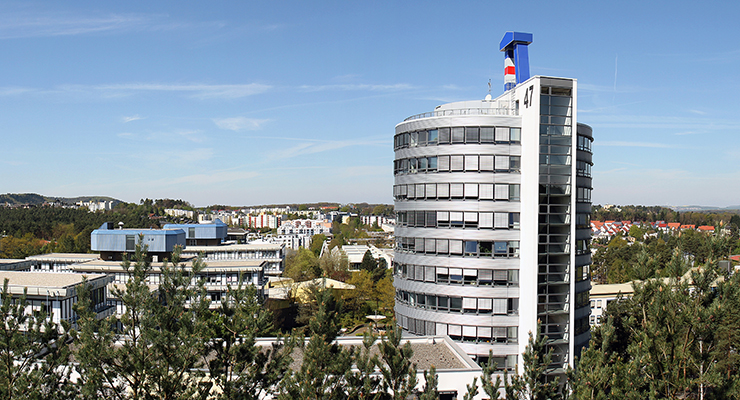
Researching together: KSB cooperates with numerous universities worldwide, including
15 different research institutions in Germany alone. Kaiserslautern Technical University is one of them.
Innovations from the think tank
With its Business Innovation Lab, KSB is exploring alternative approaches to traditional research and development processes. It is located away from the company’s locations and is not involved in the turbulence of day-to-day business. This think tank sees young and experienced KSB employees working with external experts and students to develop innovations.The Lab was founded in 2017, and is home to agile, interdisciplinary project teams on a mission to find novel, digital business models and ideas for products and services. Throughout this process they keep their sights firmly set on achieving added value for KSB’s customers. This approach facilitates the development of innovations yielding benefits such as increased operating reliability or improved ease of use for pump systems.
More cooperation in the future
The trend is clear: The number of cooperations will continue to increase in the future. Because if you want to produce the best products, you need the best minds. There are still many innovations to develop!Current KSB job opportunities for students: www.ksb.com/careers

Ankita Goutam Sarkar
Data Science
Data Science
“Working on a challenging project has boosted my confidence enormously. This will definitely help me in my
working life.”
I was very excited to be accepted for a three-month internship in KSB’s data science team. My task was to extend a
function for creating heat maps from a one-dimensional colour scale to a full three-dimensional colour space and
evaluate the results. Heat maps are an important visualisation tool for KSB’s data scientists, who use them to
create spectrograms of vibration signals for example.
My supervisors were very supportive as I tackled the task. They encouraged me to do my own research and find solutions to problems. I learned a lot and expanded my expertise.
The sensor data displayed improves error detection and correction. With the extension I created it is now possible to display three-dimensional vibration data as a compact colour spectrogram.
I am quite proud to have successfully completed this challenge. I now plan to write my master’s thesis in the Business Innovation Lab. Here, KSB is developing new digital business models. I look forward to the exciting projects ahead of us.
My supervisors were very supportive as I tackled the task. They encouraged me to do my own research and find solutions to problems. I learned a lot and expanded my expertise.
The sensor data displayed improves error detection and correction. With the extension I created it is now possible to display three-dimensional vibration data as a compact colour spectrogram.
I am quite proud to have successfully completed this challenge. I now plan to write my master’s thesis in the Business Innovation Lab. Here, KSB is developing new digital business models. I look forward to the exciting projects ahead of us.
“The collegial atmosphere supports my professional development, and there is always something new to learn. KSB
is not only an attractive company, but also a place full of interesting interaction.”
I first got to know KSB on a summer excursion organised by my university. As well as manufacturing optimised
products for vital tasks such as fresh water supply, the company is also driving forward their automation. This is
also my field of expertise at the Technical University in Kaiserslautern. The company left a lasting impression on
me. Which is why I applied directly for a specialist internship position. It allows me to use my theoretical
knowledge in practice.
During my five months of work in KSB’s research and development team, I was tasked with designing a microelectronic temperature transducer. I was also involved in KSB’s cloud-based solution for monitoring and directly reporting deviations in pump operation. Today, I work in the team as a student trainee and contribute to various projects in electronics, sensor technology and the Internet of Things.
During my five months of work in KSB’s research and development team, I was tasked with designing a microelectronic temperature transducer. I was also involved in KSB’s cloud-based solution for monitoring and directly reporting deviations in pump operation. Today, I work in the team as a student trainee and contribute to various projects in electronics, sensor technology and the Internet of Things.
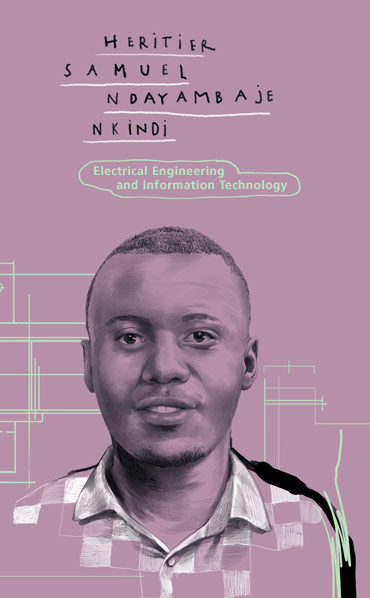
Heritier Samuel Ndayambaje Nkindi
Electrical Engineering and Information Technology
Electrical Engineering and Information Technology
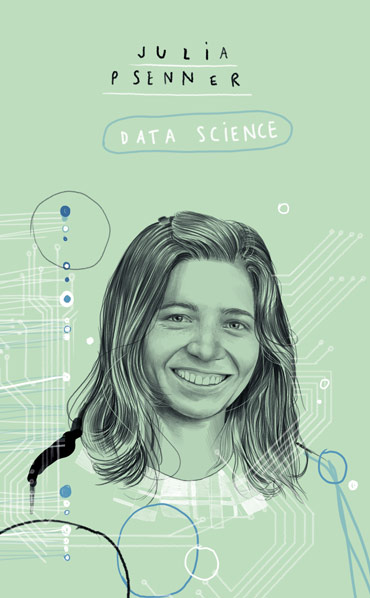
Julia Psenner
Data Science
Data Science
“I am pleased that the data model from my master’s thesis is not just gathering dust in a filing cabinet, but
might find a useful application in future.”
I wrote my master’s thesis at KSB over a six-month period. The thesis involved me creating a model using pump
process data that recognises whether two pump sets are in direct proximity to each other. This knowledge allows
measures such as pump maintenance to be planned more cost-effectively and cause less downtime. My supervisors from
KSB and my university offered
ongoing support as I was creating the model.
KSB experts from the fields of mechanical engineering and mathematics also assisted me with different approaches. I found the mixture of theory and practice very interesting. We also had to find solutions for dealing with erroneous and incomplete data. When presenting my work at KSB, I realised from the questions and the resulting discussion that my results could prove very useful. Overall a great experience!
KSB experts from the fields of mechanical engineering and mathematics also assisted me with different approaches. I found the mixture of theory and practice very interesting. We also had to find solutions for dealing with erroneous and incomplete data. When presenting my work at KSB, I realised from the questions and the resulting discussion that my results could prove very useful. Overall a great experience!
“Here at KSB I can do something tangible. I enjoy work relating to the future.”
After a four-month internship at KSB, I was offered the opportunity to continue working as a student trainee. I
did not need long to think about it. This job has enabled me to work on a range of projects. Carrying out CFD
simulations on the computer was especially interesting. These can be used to calculate the flow characteristics of
liquids and gases. The focus here was on the aeroacoustic analysis of a fan. Our goal was to reduce the time
required for the simulations while being able to completely map the experiments carried out. It was an exciting
challenge.
I am currently working on automating simulations for a prototype. The team is hoping to get more information on aspects such as noise development in a shorter time. But this is not an everyday project and I cannot reveal too much more about it. I think our loft office is great. It is a workplace for students from different disciplines. Interacting with others helps us to look beyond our own horizons. You can learn an incredible amount like this.
I am currently working on automating simulations for a prototype. The team is hoping to get more information on aspects such as noise development in a shorter time. But this is not an everyday project and I cannot reveal too much more about it. I think our loft office is great. It is a workplace for students from different disciplines. Interacting with others helps us to look beyond our own horizons. You can learn an incredible amount like this.
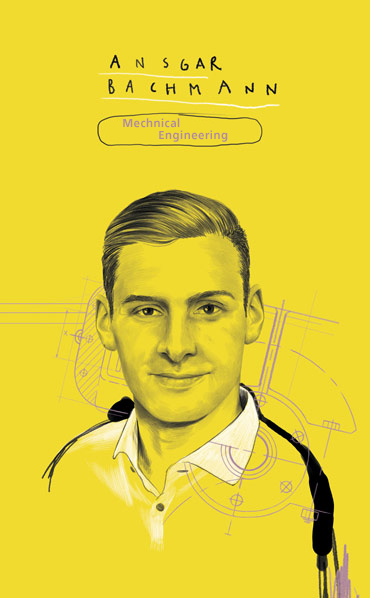
Ansgar Bachmann
Mechanical Engineering
Mechanical Engineering
Providing early inspiration
Education for children and young people is a central theme of KSB’s social engagement efforts. The company is a founding member of the initiative Wissensfabrik – Unternehmen für Deutschland e.V. [Knowledge Factory – Companies for Germany]. Since 2005, KSB has been helping awaken children’s interest in science and technology through educational partnerships with schools and nurseries. The company provides learning materials for practical experiments and exercises along with support to help teachers and daycare staff use them.Another Knowledge Factory project supported by KSB promotes early childhood language development. The Knowledge Factory also helps young entrepreneurs set up their own companies. This creates new jobs supporting prosperity and growth. Experienced mentors help the young entrepreneurs take their first steps into the world of self-employment. The initiative brings together new and established companies. This allows both to learn and benefit from each other.
See: www.wissensfabrik.de
Awakening interest: The Knowledge Factory introduces children and young people to
technology in a fun and engaging manner.

